|
|
|
Sort Order |
|
|
|
Items / Page
|
|
|
|
|
|
|
| Srl | Item |
| 1 |
ID:
130826
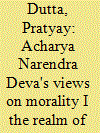

|
|
|
|
|
| Publication |
2014.
|
| Summary/Abstract |
Acharya Narendra Deva strongly believed that the Gandhian ideas based on morality and ethics could be the only solution to meet the basic needs of a society both developing and developed. It was thus that even after independence, he wielded the Gandhian weapon of Satyagraha most effectively to ?ght every form of injustice against the oppressed and the depressed in the then Indian society. Like Gandhi, he gave the highest priority for the removal of rural backwardness and he was in favour an innovative technology that could help in bringing an all round development in a developing society. He was a profound thinker who could analysis political, economic and social problems in their totality and his socio~political ideas about the solution to the problems facing the nation and society was exclusively original in its entirety. Narendra Deva accepted the value of morality and ethics of Gandhi and practised it fully throughout his whole life. It was Gandhi, who ?rst demonstrated the powerful effect on his countrymen of renouncing wealth for the sake of human service rather than personal salvation and Deva had trodden the same pathway into lndia's heart. Gandhi and Narendra Deva acquired their moral strength through renunciation, much as lndia's ancient sageswere supposed to obtain magical powers through their austerities. Their magic was singleness of purpose and an iron will. When Deva joined the Indian political
struggle under Gandhian leadership, the Mahatma once told him to simplify life and he took his words to heart. They never urged anyone else to follow their way of life and went their own way with a striking serenity. As a leading intellectual of outstanding mould, Acharya Narendra Deva had a forceful urge to bring about social justice, processed through a strong vein of idealism and always expressed deep concern for the down- trodden lndian masses. He remained a path?nder of the socialist movement in India and strongly believed that freedom was the first postulate for the establishment of the socialist society in India. He felt that without political independence the socialist programme could never become a reality. Narendra Deva always emphasized the moral and cultural elements of Marxism, but in the Indian socio-political context, he said that the class con?ict was already in existence and the real question was on whose side you were going to stand. Moreover, it was wrong to assume that the capitalist class had no vested interest in the freedom struggle. He, therefore, viewed that the socialists should create consciousness among labour, convince them that their interest would be well protected inn the freedom struggle and should broaden the base of that struggle by organizing the toilers. That is why; Gandhi and Deva wanted the historical stream of the cultural progress of India, in order to sustain the flow of continuity. In fact, Gandhi and Narendra Deva's entire socio-political ideas were ofa new social order purely based on universal love, ahimsa, morality and most importantly the role of ethics in Indian politics. Gandhi's ideal society was a non-violent and stateless society and repudiated state on ethical, historical and economic grounds. Unlike Marx, Gandhi and Deva persistently put emphasis on moral force and on the - realization of one's own self and there was no place for violence in their whole socio-political philosophy. The purpose ofthe article is to highlight the impact of ethics and morality on Narendra Deva's socio-political ideas and its relevance in the 21" century.
|
|
|
|
|
|
|
|
|
|
|
|
|
|
|
|
| 2 |
ID:
130808
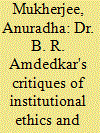

|
|
|
|
|
| Publication |
2014.
|
| Summary/Abstract |
Ethics and morality are the milestones of civilization in the true sense of the term. These concepts again are not static but evolve with greater implications and subtler nuances as humanity strives to grow towards perfection- the ultimate end of existence. ' whether biologically or spiritually. In the context of Indian thought, the traditional, age-old dictums of ethics and morality. having undergone numerous interpretations and changes have experienced a new set of values,' however latent in the traditional interpretation of Dharma or Niri- with the advent of" nationalism, the emergence of a new nation-state and the concurrent vision of human rights. The Constitution of India fully recognizes the moral as at par with the modem, that is, the western ideals of morality in the realization that in the context of Dalit uprising in modern India, the traditional ideals of ethics and morality are to be reviewed. Obviously this shows that what is legal should be ethical and moral or rather. what is ethical and moral tnust have its place in law. It is from this perspective that the modern-day Dalit struggle against injustices, age-old as they are. are to be seen and Dr.B.R. Ambedkar's initiation to this struggle was aimed at bringing ethics and morality to work at the state level, subjugating the Nili forest while lawgivers to take a backseat before the universal laws of morality. To understand Ambedkar's stand on the place of ethics and morality in Hinduism, one must see the reasons that made him strike out at the roots of Hindu social ethics. The Hindu social life was traditionally ruled by Dilemma. Dharma guided a Hindu's'Iife from birth to death by a set of rules strictly laid out for everyone in society. The observation of these rules was morality and the underlying ethics of these duties and rights was ?rst ofall, societal good, i.e., good for 'all. The second part of this ethics was that by observing this social morality, an individual will attain perfection. In accordance with these concepts, the Dharmas/zastras dictate the functions ofthe state and the king. The Nili and Dandanili emanate from one source and with one ideal- that is to maintain the social order by arranging for the speci?c duties of each and every member of society. Consequently. rights came as group rights and institutional rights as laid out in the Dharamshastra'. And over and above everything was the belief in the law of Karma that sanctified the rule of l/Z7I'l7aS/1I'uII7(l, or ones station in life as prescribed by onc's birth. These two essential features of Hindu society made it a highly stratified one so that the passage of' centuries only tightened the rules and the rituals pertaining to these two rules. The solemn and noble hymns of Rigveda. where the philosophy of Vedic seers and poets as the world being one and where everyone was the other's kin. I Va.t'zzdlmibu Kzzrumba/(um )' is the spirit of the ancient Indian Vedic realization. The utmost ideals of human dignity with the universal ethics of righteous behavior and the universal morality of conscientious behavior were preached in their fullest glory. . '
|
|
|
|
|
|
|
|
|
|
|
|
|
|
|
|
| 3 |
ID:
130825
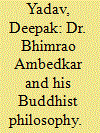

|
|
|
|
|
| Publication |
2014.
|
| Summary/Abstract |
Early Life
Bhimrao Ramji Ambedkar was born on I4 April 1891, popularly also known as Babasaheb, was an Indian jurist, politician, philosopher. anthropologist, historian and economist. A revivalist for Buddhism in India, he inspired the Modern Buddhist movement. As independent India's first law minister, he was the principal architect of the Constitution of India. Born into a poor Mahar family, Ambedkar campaigned against social discrimination, the Indian caste system. He converted himself to Buddhism and is also credited with providing a spark for the conversion of hundreds of thousands of lower caste members to Buddhism. Ambedkar was posthumously awarded the Bharat Ratna, India's highest civilian award, in 1990. Having earned a law degree and doctorates for his study and research in law, "economics and political science from Columbia University and the London School of Economics, Ambedkar gained high reputation as a scholar and practiced law for a few years, later campaigning by publishingjoumals advocating political rights and social freedom for India's untouchables. He is regarded as a Bodhisattva by some Indian Buddhists. though he never claimed it himself.
|
|
|
|
|
|
|
|
|
|
|
|
|
|
|
|
| 4 |
ID:
130822
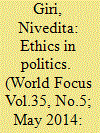

|
|
|
|
|
| Publication |
2014.
|
| Summary/Abstract |
Till recently when India passed through its l6th general Elections, the election Commission of India appealed Indian citizens to select candidates and dump the criminals and the corrupt ones. It also urged the voters to sign a pledge to be ethical while casting their votes in the coming Lok Sabha elections. The Election Commission also appealed the voters to cast their votes without fear or greed, and without keeping caste, religion and creed consideration in mind. The commission's letter also stated that electing a candidate is not merely a citizen's right but his/her responsibility. Ethics and morality have been the hallmark of public life in India since ancient times. Rulers were expected to observe stricter ethical values. Ethics and politics, in other words, were inseparable. This ethical and moral legacy was inherited by its national leaders, who demonstrated a high degree of probity and honesty in public life during the freedom struggle. The early national leaders and political philosophers believed that politics without morality is a thing to be voided. However, in recent years there is a general feeling that all is not well with the Indian political system which is functioning under great strain. It has been noticed and concerns are being expressed over the general decline of values in public life. Recent trends in politics, however, appear to have created an impression as if, the capacity of Indian democratic system to ensure integrity in public life is increasingly going down.
|
|
|
|
|
|
|
|
|
|
|
|
|
|
|
|
| 5 |
ID:
128291
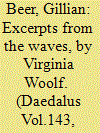

|
|
|
|
|
| Publication |
2014.
|
| Summary/Abstract |
Here is a hall where one pays money and goes in. where one hears music among somnolent people who have come here after lunch on a hot afternoon. We have eaten beef and pudding enough to live for a week without tasting food. Therefore we cluster like maggots on the back of something that will carry us on. Decorous, portly - we have white hair waved under our hats: slim shoes: little bags: clean-shaven cheeks: here and there a military moustache. not a speck of dust has been allowed to settle anywhere on our broadcloth. Swaying and opening programmes. with a few words of greeting to friends. we settle down. like walruses stranded on rocks. like heavy bodies incapable of waddling to the sea. hoping for a wave to lift us. but we are too heavy. and too much dry shingle lies between us and the sea. We lie gorged with food, torpid in the heat. Then. swollen but contained in slippery satin. the sea-green woman comes to our rescue. She sucks in her lips. assumes an air of intensity. in?ates herself and hurls herself precisely at the right moment as if she saw an apple and her voice was the arrow into the note. 'Ah !' "An axe has split a tree to the core: the core is
warm: sound quivers within the bark. 'Ab.' cried a woman to her lover, leaning from her window in Venice. 'Ah. Ah !' she cried. and again she cries 'Ah !' She has provided us with a cry. But only a cry. And what is a cry? Then the beetle-shaped men come with their violins: wait; count; nod; down come their bows. And there is ripple and laughter like the dance of olive trees and their myriad-tongued grey
|
|
|
|
|
|
|
|
|
|
|
|
|
|
|
|
| 6 |
ID:
130791
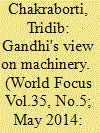

|
|
|
|
|
| Publication |
2014.
|
| Summary/Abstract |
Mahatma Gandhi held a distinctive place in the history of Indian freedom movement as well as in the
momentous evolution from tradition to modernity. During the time-period ranging from l9l6 to 1947,
Gandhi had revealed his luminous dexterity and methods which made him the vanguard of the nation,
by the relentless logic of history. He was an iconoclast. Who quivered the basics of the powerful British Empire in India through multiple novel means such as non- violent, satyagraha, . Fasting, hartals, non'-cooperation and mass civil disobedience. Gandhi was a multifaceted virtuoso who applied his mind to glitches of human distress. His social ideas amply exhibited a deep and abiding consciousness of the fundamental reformation of the Indian society. In the economic sphere, he ardently believed that the economic salvation of India exclusively depended on the economic regeneration of vast millions of Indians living in the rural areas. ln line with such a policy. he championed the promotion of small scale village and cottage industries, which could offer productive employment on a long-term basis to the common masses of India. At the political level, Gandhi felt that the state was a means of intimidation, since it was likely to demoralize the cherished essential freedom of individuals. As an individualist, Gandhi judged that individuals could enhance their traits through truth and non-violence, drenched with an ambience of freedom.
|
|
|
|
|
|
|
|
|
|
|
|
|
|
|
|
| 7 |
ID:
131144
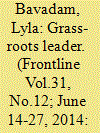

|
|
|
|
|
| Publication |
2014.
|
| Summary/Abstract |
Gopinath Pandurang Munde (1949-2014) was a simple man comfortable in his rural roots. A stranger to Machiavellian Political machination, he owed his success to sheer determination.
|
|
|
|
|
|
|
|
|
|
|
|
|
|
|
|
| 8 |
ID:
128290
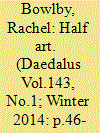

|
|
|
|
|
| Publication |
2014.
|
| Summary/Abstract |
In this piece. I look at an essay that l have probably read too often not to find in it the key to all matters
aesthetic, historical. philosophical, and more. The essay is Charles Baudelaire°s Le Peintre de la vie modeme (The Painter of Modern Life), first published in 1863 and written, most probably, around 1859 to 1860. Baudelaire's exhilarating innovation is to down- play the signi?cance of eternal value in art. in favor of what he designates as its other half, the ?eeting presentness that is modernity. My essay is unapologetically an appreciation - for the most part - of a text that, in focusing on another artist, itself appears to be just that.' For Baudelaire develops his arguments through a mock-anonymous celebration of the artist Constantine Guys, referred to as M. G. (Monsieur G.). Guys's proli?c sketches, done at speed, for rapid journal publication, chart the smallest of day-by- day changes and typical scenes in contemporary life. Guys's pictures - the art of modernity - give to the day a second life. and "translate" into a different medium - from sight to (mental) impression to its "rebirth" as a sketch - that which would otherwise be lost with its passing.
|
|
|
|
|
|
|
|
|
|
|
|
|
|
|
|
| 9 |
ID:
128299
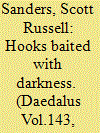

|
|
|
|
|
| Publication |
2014.
|
| Summary/Abstract |
I first read Walden when l was seventeen. the summer before starting college. at the urging of a high school teacher who sensed that my adolescent mind. brimming with questions, would bene?t from grappling with a truly radical thinker. Much of the book baf?ed me. The tone shifted unpredictably from conversational to prophetic, from jokey to stem, from earthy to mystical. I was bewildered by some of the lengthy sentences, which zigvagged among ideas and images. and l was stumped by the cryptic short ones. which seemed to compress whole paragraphs of meaning into a few words. Not yet having made any big decisions about how to lead my life, I couldn't ?gure out what was troubling this Henry David Thoreau. So what if his neighbors
thought he should use his Harvard degree to land a job and a wife, and then proceed to have kids, buy a
house. get rich. and distribute aims to the poor? Couldn't he just ignore the scolds and go his own way? Not yet having lost a loved one to accident. illness. or old age, I only dimly understood his brood- ing about that amoral process we call nature. So what if armies of red ants and black ants slaugh- tered one another, herons gobbled tadpoles, a dead horse stank up the woods, or a thousand seeds per- ished for each one that took root? What did all that mayhem and waste have to do with us, the owners of souls aiming at heaven ?
|
|
|
|
|
|
|
|
|
|
|
|
|
|
|
|
| 10 |
ID:
130792
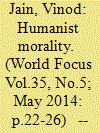

|
|
|
|
|
| Publication |
2014.
|
| Summary/Abstract |
Earlier the world as a whole was a conflict -zone. People living in a particular region had norms and morality which served them well. But that morality was at the cost of people living in other regions because of conflicts between them. So, that morality involved inhumanity towards those living outside their regions. Now due to growth of science, industry and technology, the world seems to be coming closer to all; the unfamiliarity that prevailed earlier between people of different regions is diminishing and familiarity is growing. People around the globe are becoming aware of this. innumerable institutions that are taking shape are spreading the awareness about the inadequacy of old thinking, ideas and morals. Take Europe for instance. Different regions or countries of Europe were indulging in prolonged wars with each other. This, after the Second World War, changed. They realized the futility of it all, and established various institutions like the European Union. Thus reducing and extinguishing the con?icts between them, leading thereby not only to a prolonged period of peace but to unheard of prosperity.
|
|
|
|
|
|
|
|
|
|
|
|
|
|
|
|
| 11 |
ID:
128294
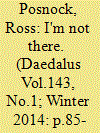

|
|
|
|
|
| Publication |
2014.
|
| Summary/Abstract |
Perhaps, like me. you have a propensity to collect books without quite knowing why. Over the years I have piled up books by and about, say, Ludwig Witt- genstein, Hannah Arendt, George Santayana, Philip Roth, Ad Reinhardt, Philip Guston, Franz Rosen- zweig, Penelope Fitzgerald, Thomas Bernhard - and not only not read them, but have no desire to do so. I have kept busy working on other things. And for a decade or two at a time. these texts simply gather dust on my shelves. But then, inevitably. I am drawn to these nearly forgotten volumes and. strangely, they prove pivotal to a new project: l recall. for instance, that Santayana ascended, literally, from the obscurity of a low shelf to earn a chapter in my book on William and Henry James. Wittgenstein made an analogous, if more circuitous, journey from the shadows, waiting untouched, until five years ago when I kept a long-held inner vow to read an- other languishing tome, one that had stared me down so often it had acquired an aura of intimidation: Stanley Cavell's The Claim of Reason: Wittgen-stein, Skeptirism, Morality and Tragedy. It was indeed intimidating. but also inspiring: that experience opened the door to more Cavell - and to deeper engagements with Emerson - and to Wittgenstein, who has joined the sage of Concord as a central ?gure in my current project on writers. artists. and philosophers who renounce their careers. The peculiarities of this manner of book buying - the absence of full consciousness and the long gap between acquisition and reading - puts me in mind
|
|
|
|
|
|
|
|
|
|
|
|
|
|
|
|
| 12 |
ID:
130790
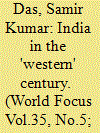

|
|
|
|
|
| Publication |
2014.
|
| Summary/Abstract |
In a paper written not quite long ago, I argued that the rise of Asia including in particular such powers as China, and India in recent decades takes places in a century that continues to remain western. As I concluded.
|
|
|
|
|
|
|
|
|
|
|
|
|
|
|
|
| 13 |
ID:
132331
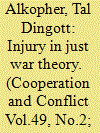

|
|
|
|
|
| Publication |
2014.
|
| Summary/Abstract |
The paper traces the evolution of just war discourse and its historicity. Taking St Augustine's crucial definition of just war as a war to avenge injuries as our starting point, we focus on the concept of injury in 'just war' discourse. The genealogy of the notion of injury is traced through the continuities, ruptures, and leaps in the evolution of its meaning, starting from the conceptualization of just war in medieval thinking to its manifestation in feminist thought. It specifically explores two aspects of the way injury is conceptualized: the meaning ascribed to the actual concept of injury and, secondly, the constructed appropriate reaction to injury. In conclusion, we assess how far injury is indeed socially constructed and try to determine the impact of its socially constructed meaning on just war thinking and possibly warlike practices.
|
|
|
|
|
|
|
|
|
|
|
|
|
|
|
|
| 14 |
ID:
130604
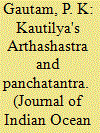

|
|
|
|
|
| Publication |
2014.
|
| Summary/Abstract |
Kautilya"s Arthasastra composed and compiled, in Sanskrit, between the 4"' Century BCE to the 3"' Century CE, is an exhaustive treatise on statecraft and issues of diplomacy, war, peace. intelligence, security, law, and political economy. Discovered in full text form in the early 1900s and then translated into English and
other languages, it is one gem of political theory which stands out prominently in the corpus of the rich but under-explored indigenous ancient history of India. Johann Jakob Meyer, the German lndologist and translator of the work from Sanskrit to German in 1927, remarked that Kautizya's Arthasastra is not a book but a library of ancient India.
|
|
|
|
|
|
|
|
|
|
|
|
|
|
|
|
| 15 |
ID:
128295
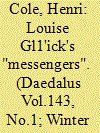

|
|
|
|
|
| Publication |
2014.
|
| Summary/Abstract |
You have only to wait, they will find you. The geese ?ying low over the marsh, glittering in black water. They find you. And the deer - how beautiful they are. as though their bodies did not impede them. Slowly they drift into the open through bronze panels of sunlight. Why would they stand so still if they were not waiting? Almost motionless, until their cages rust, the shrubs shiver in the wind. squat and lea?ess. You have only to let it happen: that cry - release, release - like the moon wrenched out of earth and rising full in its circle of arrows until they come before you like dead things. saddled with ?esh. and you above them. wounded and dominant.
|
|
|
|
|
|
|
|
|
|
|
|
|
|
|
|
| 16 |
ID:
123414


|
|
|
|
|
| Publication |
2013.
|
| Summary/Abstract |
The darkness was just descending on the campus of the Columbia University in USA. It was in the month of March in 1917. A tall and lanky Bengali Gentleman about 6'2'' high was coming forward with his long steps ahead. If anybody looked him at a glance he could instantly understand how bright he actually was. He was then glittering with his intelligence and sharp eyes. But within moments, a handful of young and robust people from Intelligence Dept.
|
|
|
|
|
|
|
|
|
|
|
|
|
|
|
|
| 17 |
ID:
127842
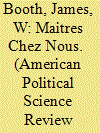

|
|
|
|
|
| Publication |
2013.
|
| Summary/Abstract |
Alan Patten's social lineage account of cultural continuity is the most recent effort to provide multicultural theory with a non-essentialist concept of culture, its continuity and loss that meets broadly liberal normative desiderata. In this essay, I argue that it too fails to offer an alternative to essentialism, to meet standard liberal normative stipulations, and to construct a theory of continuity sufficient to underpin the present claims of involuntarily incorporated communities. That result is theoretically interesting for it shows the deep intractability of the problems at the core of liberal multiculturalism.
|
|
|
|
|
|
|
|
|
|
|
|
|
|
|
|
| 18 |
ID:
030300


|
|
|
|
|
| Publication |
London, Oxford University Press, 1966.
|
| Description |
114p.hbk
|
| Series |
South Asian Affairs; no.2
|
| Contents |
St Antony's Papers; no. 18
|
|
|
|
|
|
|
|
|
|
|
|
Copies: C:1/I:0,R:0,Q:0
Circulation
| Accession# | Call# | Current Location | Status | Policy | Location |
| 000195 | 954.035/MUK 000195 | Main | On Shelf | General | |
|
|
|
|
| 19 |
ID:
128470
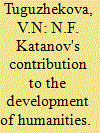

|
|
|
|
|
| Publication |
2013.
|
| Summary/Abstract |
Professor N. F. Katanov has been one of the famous and outstanding national scholars and thinkers of Russian science, education and culture at .the turn of nineteenth and early twentieth century} Scientific and
pedagogic activity of N. F. Katanov is multidimensional. Famous Russian Turkologist G. I. Iskhakov wrote: "Turkologist-orientalists O. N. Blhtlingk, M. A. CastrEn, V. V. Radloff, I. N. Berezin and others_laid the foundation of oriental studies in Russia, then Professor N. F. Katanov enriched this science with new data in the sphere of linguistics, history, archaeology and ethnography through his self-sacrificing work, scrupulous I investigation and long-term research of a language and oriental peoples' ' culture. And, therefore, he got into the line of biggest world scholars"? In oriental studies N. F. Katanov is famous as a scholar encyclopedist having wide interests - language, literature, folklore, history, archaeology, ethnography, numismatology, museology. His scientific interest was not only in history and culture of the Turkic-speaking peoples but also in the Slavonic, Ugro-Finnic, Chinese, Japanese, Arabic, Persian, Indian peoples. He could speak almost all the European languages, many oriental languages, knew also petrified and dead classic languages, read Turkic runes, Sumerian wedge writing, Egyptian and Chinese hieroglyphs, Sanskrit writing, Arabic ligatured script, Old Uyghur and Aramaic ' graphics ?uently". N. F. Katanov's biographers report that he used the data of 114 world languages in his works.'
|
|
|
|
|
|
|
|
|
|
|
|
|
|
|
|
| 20 |
ID:
128876
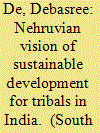

|
|
|
|
|
| Publication |
2014.
|
| Summary/Abstract |
As the first Prime Minister of India, Nehru pursued a policy of rapid industrialisation and national development, largely equated with economic growth and surplus. He once said that dams are the temples of modern India and claimed that big dams would address India's hunger and poverty. However, such development agenda also created much pain and suffering for the owners/users of land sacrificed in the public interest, mostly the indigenous people of India (Adivasis). This article critically analyses the impact of development policies on the Adivasi peoples of India, earlier and today. It argues specifically that Nehru's well-sounding development concept of Panchsheel, the 'Five Pillars of Tribal Development', did not work for the Adivasis and largely ruined their own efforts to secure sustainable development.
|
|
|
|
|
|
|
|
|
|
|
|
|
|
|
|
|
|
|
|
|